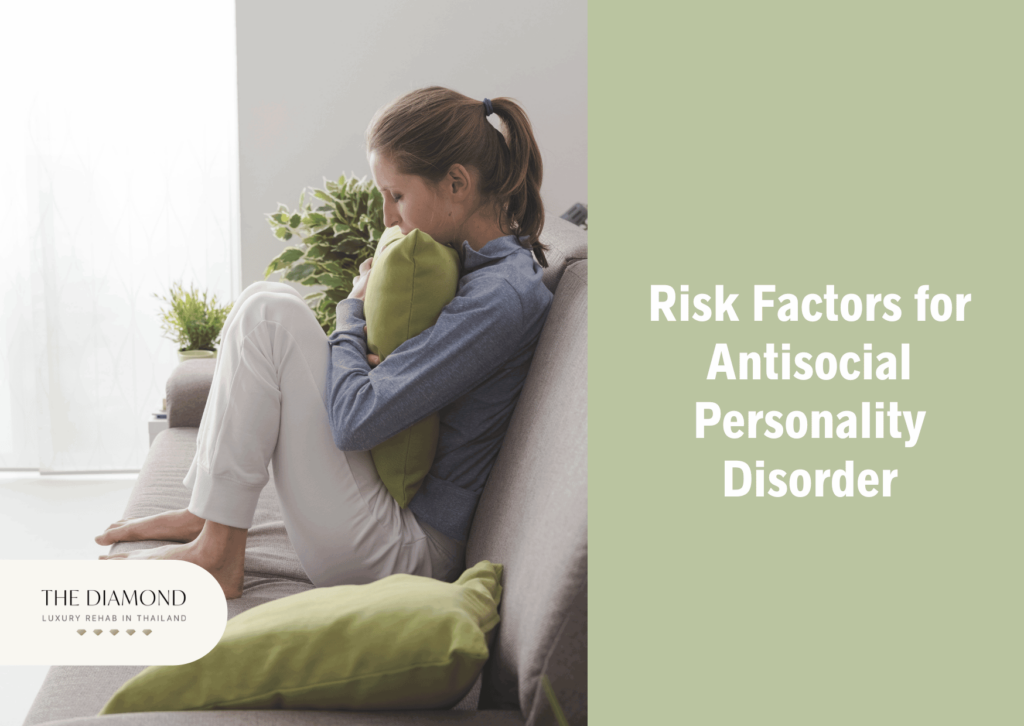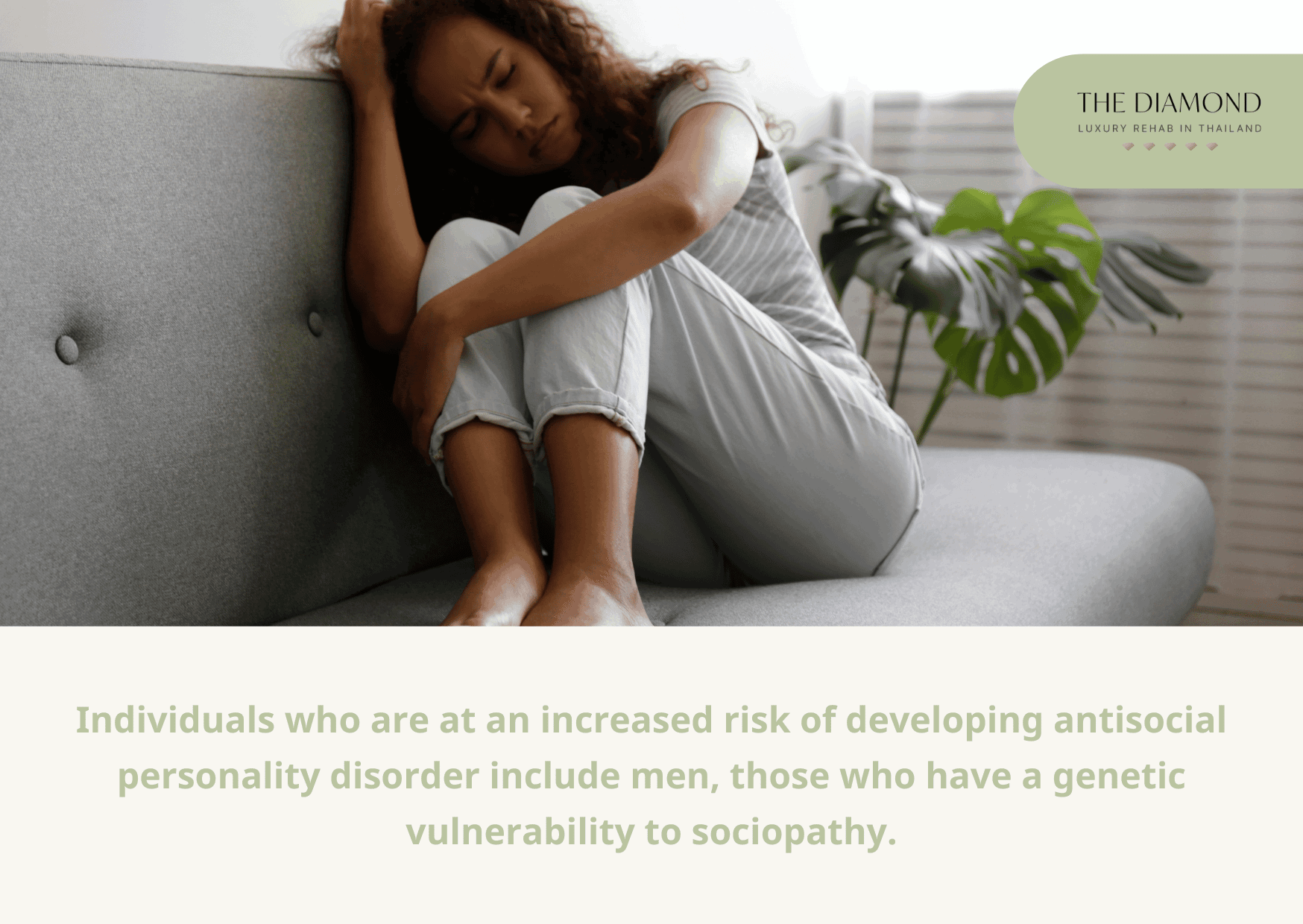Antisocial personality disorder (ASPD)
Table of content
- What is Antisocial personality disorder (ASPD)?
- What are the symptoms of Antisocial personality disorder?
- What are the causes of Antisocial personality disorder?
- What are the risk factors for Antisocial personality disorder?
- How Is Antisocial personality disorder diagnosed?
- When does Antisocial personality disorder (ASPD) begin?
- Who is at risk of developing Antisocial personality disorder?
- How is Antisocial personality disorder (ASPD) treated?
- Is it possible to prevent Antisocial personality disorder (ASPD)?
- Is there a test for Antisocial personality disorder (ASPD)?
- Is having Antisocial personality disorder (ASPD) the same as being a sociopath?

Antisocial personality disorder is a mental illness that causes a long-term pattern of ignoring and violating the rights of other people without a display of remorse. Otherwise known as sociopathy, people with the condition have little to no conscience and empathy.
The symptoms of antisocial personality disorder include acting without regard to right or wrong, using lies to manipulate others, failing to think about the consequences of their actions, showing arrogance, and feeling hostile toward other people. The dominant signs of sociopathy often result in negative consequences.
The effects of antisocial personality disorder include legal problems, use of illegal drugs, alcohol dependence, co-occurring mental health problems, and poor life outcomes. This personality disorder also has distinct features that aid in giving a diagnosis of the condition. The characteristics of antisocial personality disorder include a refusal to adhere to social norms, a lack of concern about other people’s feelings, an inability to form long-lasting relationships, and a tendency to blame others for their misbehavior.
Treatments for antisocial personality disorder mainly include behavioral therapy and the use of psychiatric medications. However, the condition is difficult to treat, so treatment options focus on managing or dealing with the symptoms and behaviors involved in ASPD.
What is Antisocial personality disorder (ASPD)?
Antisocial personality disorder (ASPD) is a mental disorder in which an individual shows no empathy or regard for other people’s rights or feelings. Someone with sociopathy may use their wit or charm to deceive others and manipulate them for personal benefit, all the while showing no remorse for the consequences of their hurtful actions.
Due to the destructive and reckless behaviors involved in antisocial disorder, someone with the condition may also completely disregard the law and, therefore, is more likely to participate in criminal acts.
What are the symptoms of Antisocial personality disorder?
The symptoms of antisocial personality disorder include a lack of empathy, acting without regard to right or wrong, impulsiveness or failing to think about the consequences of their actions, showing arrogance, and feeling hostile toward other people.
Although the symptoms of ASPD vary from person to person, the most notable signs of the condition tend to occur in both adult men and women. However, a 2013 research on sex differences in antisocial personality disorder published in the journal Personality Disorders suggests that men with ASPD are more likely than women to engage in illegal and violent actions.
On the other hand, women with the disorder have an increased risk of committing nonviolent antisocial behaviors, such as failing to fulfill work obligations or missing school.
Adults with antisocial personality disorder often show signs and symptoms of conduct disorder in childhood or teenage years. Furthermore, a diagnosis of ASPD may only be given if a person has shown conduct disorder symptoms before the age of 15, although a formal diagnosis can only be made at age 18, according to a 2023 continuing education activity on antisocial personality disorder published in StatPearls.
The most common symptoms of antisocial personality disorder in teens include serious violation of rules, frequent fighting, firesetting, animal cruelty, irritability, aggressiveness, deceitful behavior, as well as an alarming lack of empathy and conscience.
Although some patterns of behavior seen in ASPD may occur in children as a part of their childhood from time to time, it is imperative to seek a formal diagnosis at the earliest possible moment to have prompt treatment.
What are the causes of Antisocial personality disorder?
The causes of antisocial personality disorder include genetics, structural abnormalities in the brain, childhood abuse or trauma, and a chemical imbalance in the brain.
The single, exact cause of the disorder is not known. However, experts believe that a complex interplay of factors influence the development of the disorder, just like how each individual’s personality is molded by a variety of forces that interact in a wide variety of ways.
Being born with a genetic vulnerability to antisocial personality disorder may cause someone to develop the condition, and environmental factors may exacerbate its development. Structural abnormalities in the brain are also associated with ASPD. According to a 2012 article titled, “Psychopathy linked to specific structural abnormalities in the brain” from ScienceDaily, a study led by researchers at King’s College London found that people with the disorder have reduced gray matter volume in the frontal lobe. This is the region of the brain responsible for impulse control, emotions, and social interaction.
Experiencing abuse or trauma as a child also puts a person at an increased risk of developing antisocial personality disorder. Behavior patterns learned from abusive parents as a child may also be passed on to their own kids.
People with ASPD may experience a chemical imbalance in the brain as well, with the serotonin system believed to play a role in the development of antisocial and aggressive behavior in both adults and children
What are the risk factors for Antisocial personality disorder?

The risk factors for antisocial personality disorder raise a person’s risk of developing antisocial behavior. The risk factors for antisocial personality disorder are listed below.
- Family history of antisocial personality disorder or other mental illnesses: Having blood relatives with antisocial personality disorder or other mental health conditions may up an individual’s risk of developing ASPD and environmental factors can also make it worse.
- Gender: Gender is one of the most relevant predictors for antisocial behavior, with the condition affecting more men than women. A 2005 comparative study by Compton et al., published in The Journal of Clinical Psychiatry also suggests that men are three to five times as likely as women to be diagnosed with antisocial personality disorder.
- Being diagnosed with conduct disorder during childhood: The majority of adults with antisocial behavior have shown symptoms of conduct disorder as children. ASPD is also the only personality disorder that requires a diagnosis of conduct disorder before the age of 15.
- Experiencing childhood trauma or abuse: Being subjected to childhood trauma or abuse is believed to play a role in the development of antisocial personality disorder. Growing up in neglectful and unstable homes can inhibit a person to improve self-control and develop empathy for others.
- Alterations in brain chemistry and structure: People with antisocial behavior have significant differences in brain areas that greatly impact impulse control and emotions. Those diagnosed with the condition also tend to have lower levels of serotonin, which is a neurotransmitter that affects mood and behavior.
Other risk factors for antisocial personality disorder include:
- Lack of parental affection
- Growing up in difficult family circumstances
- One or both parents with alcohol dependence disorder
- Past substance use disorder
- Frequent fighting in school at age 15
How Is Antisocial personality disorder diagnosed?
Antisocial personality disorder is diagnosed by conducting a thorough psychological evaluation after the possibility of other health conditions have been ruled out through a medical evaluation.
A mental health specialist may evaluate an individual’s behavior by looking for patterns of disregard for the rights of other people or impulsive behavior with no remorse for hurtful actions.
Finally, a formal diagnosis may be given after the symptoms of the patient with suspected sociopathy were found to have met the diagnostic criteria for antisocial personality disorder listed in the Diagnostic and Statistical Manual of Mental Disorders or DSM-5.
When does Antisocial personality disorder (ASPD) begin?
Antisocial personality disorder (ASPD) usually begins during childhood, at the age of eight, according to a 2015 article by Donald W. Black, MD published in The Canadian Journal of Psychiatry. Onset of antisocial personality disorder symptoms at this age or before age 18 will most likely result in a diagnosis of conduct disorder.
However, if antisocial behaviors have persisted after age 18, the diagnosis will be converted into ASPD. Although considered as a lifelong condition for most people, antisocial personality disorder tends to get better with age in certain cases.
Who is at risk of developing Antisocial personality disorder?

Individuals who are at an increased risk of developing antisocial personality disorder include men, those who have a genetic vulnerability to sociopathy, people who received a conduct disorder diagnosis during childhood, as well as individuals who experienced childhood abuse and neglect.
Antisocial personality disorder appears to be more common in men than in women. Men are also more likely to develop substance abuse that could lead to aggressive or impulsive behaviors. Moreover, a 2015 research by Schoenmacker et al., published in Psychiatry Research suggests that substance abuse is strongly associated with a diagnosis of ASPD.
Having a first-degree relative with sociopathy or other mental disorders also puts a person at an increased chance of developing antisocial behavior. Environmental factors such as traumatic life experiences can exacerbate its development.
Evidence also suggests that most adults who were diagnosed with antisocial personality disorder have displayed signs of conduct disorder during childhood. Finally, experiencing adverse childhood experiences such as abuse and neglect increases the risk of developing ASPD. Individuals diagnosed with the condition were found to have high rates of physical and sexual abuse during childhood.
How is Antisocial personality disorder (ASPD) treated?
Antisocial personality disorder (ASPD) is treated through medications and other forms of therapy that may help manage its symptoms. The treatment options for antisocial personality disorder are listed below.
- Psychotherapy: Cognitive behavioral therapy (CBT) is a form of psychotherapy that is used in the treatment of antisocial personality disorder. A 2010 study on psychological interventions for antisocial personality disorder published in the Cochrane Database of Systematic Reviews states that CBT puts emphasis on encouraging the afflicted person to gain a new perspective on how their thoughts, feelings, and emotions affect their behavior.
- Antidepressants: Antidepressants such as selective serotonin reuptake inhibitors (SSRIs) can help manage symptoms of ASPD by regulating levels of serotonin in the brain, which influences mood and emotions.
- Antipsychotics: According to a study by Brown et al., published in the October 2014 issue of CNS Spectrums, atypical antipsychotics such as clozapine, risperidone, or quetiapine may help control impulsive-behavioral dyscontrol and anger, aggression, as well as violence in individuals with antisocial personality disorder.
- Mood stabilizers: may include lithium or carbamazepine. These medications are used to control impulsive anger and intense mood shifts in ASPD, according to a 2010 study on the pharmacological interventions for antisocial personality disorder written by Khalifa et al.
- Antianxiety medications: Individuals with ASPD often present with other problems, including a variety of anxiety disorders. People who have agitation, anxiety, or insomnia along with antisocial behavior may benefit from these medications.
Is it possible to prevent Antisocial personality disorder (ASPD)?
No, it is not possible to prevent antisocial personality disorder (ASPD). However, early interventions may be beneficial for those who are diagnosed with conduct disorder during childhood.
Prompt treatment with therapy may help prevent persistence of symptoms and possible escalation of the condition into antisocial personality disorder in adolescence. Involvement of parents in these interventions can also improve academic performance in children with severe antisocial behavior, according to a 2014 study by Scott et al., published in The American Journal of Psychiatry.
Is there a test for Antisocial personality disorder (ASPD)?
No, there is no test that can be used to diagnose antisocial personality disorder. Not even conducting physical tests, including blood tests and imaging, can diagnose the condition.
Several websites offer online ASPD tests, which include questions that aim to identify any ASPD symptoms a person may be exhibiting. These tests, however, are not official diagnostic tools and are not meant to be a substitute for a formal diagnosis.
Is having Antisocial personality disorder (ASPD) the same as being a sociopath?
Yes, having an antisocial personality disorder diagnosis is the same as being a sociopath. Sociopath is a term used to refer to someone living with ASPD. However, while antisocial personality disorder is an official diagnosis in the DSM-5, sociopathy is not an officially recognized condition in the psychiatry text.
Another term that is sometimes used interchangeably with sociopath is psychopath. And although psychopathy does not also represent an official diagnosis, a few studies have explored the topic of antisocial personality disorder vs. psychopathy and have suggested some differences between the two.
For instance, people with ASPD or sociopaths often have little empathy and resort to justifying their actions, but they can distinguish what is right from what is wrong. Psychopathy, on the other hand, is characterized by the absence of empathy and a lack of moral sense, according to a 2023 article titled, “How Sociopaths and Psychopaths Are Different” from WebMD.
With that said, even though the word sociopathy has been used by mental health specialists for decades now, since it is not an official diagnosis, a lot of stigma is attached to the term, especially for people with antisocial personality disorder.
Therefore, it is best to be careful of the language we use to describe mental health matters, as the meanings we attach to these words can contribute to stigma and discrimination.

